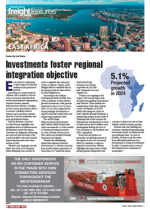Ea st Africa is continuingto show signs of economic resilience and promise of growth.According to a recent study by Deloitte, this is thanks to factors such as economic stimulus from various international organisations, renewed investor interest, infrastructure reforms, a healthy services sector, government efforts to nurture a healthy investor climate and to promote tourism after the Covid-19 pandemic, and good agricultural output.Duncan Bonnett, a partner at Africa House, highlights the significant focus on infrastructure development across the region. Countries are diligently enhancing the road and rail networks, with concerted efforts directed towards improving the power and water sectors as well.“Massive port upgrades are also under way, such as in Tanzania where financing was secured in 2023 to upgrade the main port of Dar es Salaam. There's a full-f ledged effort to establish this as the primary hub for East Africa,” he told Freight News.According to the African Development Bank (Af DB), East Africa continues to lead Africa’s growth momentum, with growth projected to rise to 5.1% in 2024 and 5.7% in 2025, supported by strong strategic investments to improve internal connectivity and deepen intra-regional trade.The Af DB’s latest Macroeconomic Performance and Outlook (MEO) found that Africa accounts for 11 of the world’s 20 fastest-growing economies in 2024. Several of these are in East Africa and include Rwanda, Tanzania and Uganda.“Despite the challenging global and regional economic environment, 15 African countries have posted output expansions of more than 5%,” reads the report, which found that Rwanda was looking at growth of 7.2% this year, Tanzania 6.1% and Uganda 6%.“Projects are ongoing in the region, with several large-scale developments gaining momentum,” said Bonnett. These include the construction of the East African Crude Oil Pipeline (EACOP) which will transport crude oil from Uganda through Tanzania, a massive gas project in the south of Tanzania that would surpass the Mozambican development in terms of value and an $850-million road development linking the Port of Dar es Salaam to the Zambian and DRC Copperbelt.Road and rail projects in particular are gaining traction in the region as part of a concerted effort by countries to improve regional connectivity. Deloitte highlights the importance of this, saying regional integration will continue to play a key role in East Africa’s overall economic growth.Bonnett said one challenge for countries remained balancing large investment spend on infrastructure and realising value. “As seen in Zambia, it's easy to tip the scales from affordable infrastructure development to being overwhelmed by debt. Countries need to ensure the infrastructure investment is sustainable.”

